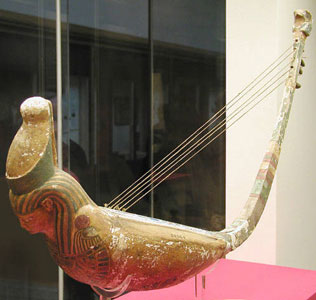
In Ancient Egypt the “Harper’s Song” (or Song of the Harper) is a poem which was inscribed in the tomb along with the image of a blind man playing a harp. It is thought that the harpist played and sang the song during the mortuary feats for the deceased.
A version of the “Harper’s Song” is sometimes found in Old Kingdom tombs but these versions tend to be short and they espouse a very traditional view of life and death.

Later versions are much longer and are notable because they display a marked difference in viewpoint to that which is generally associated with Ancient Egyptian philosophy. The poems encourage the listeners to “seize the day” and reject the more traditional view of eternity, even satirizing the building of large funerary monuments and noting that possessions cannot be taken into the afterlife with the deceased.
Harper’s Song: Tomb of Intef
This version of the poem is from the tomb of the pharaoh Intef (Middle Kingdom). There is also a copy of the text on the Papyrus Harris 500 (New Kingdom).
He is Happy this good prince:
Death is a kindly fate.
A Generation passes, Another stays,
Since the time of the ancestors.
The gods who were before rest in their tombs,
Blessed nobles too are buried in their tombs.
(Yet) those who built tombs,
Their places are gone,
What has become of them?
I have heard the words of Imhotep and Hordjedef,
Whose sayings are recited in whole.
What of their places?
Their walls have crumbled,
Their places are gone,
As though they had never been!
None comes from there,
To tell of their needs,
To calm our hearts,
Until we go where they have gone!
Hence rejoice in your heart!
Forgetfulness profits you,
Follow your heart as long as you live!
Put myrrh on your head,
Dress in fine linen,
Anoint yourself with oils fit for a god,
Heap up your joys,
Let your heart not sink!
Follow your heart and your happiness,
Do your things on earth as your heart commands!
When there comes to you that day of mourning,
the Weary-hearted (Osiris) hears not their mourning,
Wailing saves no man from the pit!
Make holiday, Do not weary of it!
Lo, none is allowed to take his goods with him,
Lo, none who departs comes back again!
Translation by Donald Mackenzie, Egyptian Myth and Legend.
Harper’s Song: Tomb of Neferhotep
The following version was found in the tomb of Neferhotep, the priest. It was inscribed during the New Kingdom of Ancient Egypt.
How reposed is this righteous lord
The kindly fate has come to pass
Bodies pass away since the time of the gods
New generations come in their place
Re shows himself at dawn
Atum goes to rest in the western mountains
Men beget, Women conceive
Every nostril breathes the air
Dawn comes and their children have gone to their tombs
Make holiday Oh priest
Put incense and fine oil together to your nostrils
And garlands of lotus and rrmt flowers to your breast
While your sister who you love sits at your side
Put song and music before you
Cast all evil behind you
Think of your joys
Until that day has come of landing
At the land that loves silence
Where the heart of the one whom he loves does not weary
Make holiday, Neferhotep the justified
Good priest, pure of hands
I have heard all that happened to the [ ]
Their buildings have crumbled
Their dwellings are no more
They are as if they had not come into being
Since the time of the God
Adapted from M Lichtheim (1976) Ancient Egyptian Literature Vol 2
Harper’s Song: Tomb of Inherkhawy
The following version was found in the tomb of Inherkhawy, the overseer of workers at the royal cemetery of Thebes. It was inscribed during the New Kingdom of Ancient Egypt.
Sung by his Harpist for Osiris, Chief of the Crew in the place of Truth, Inherkhawy, who says:
I am this man, this worthy one,
who lives redeemed by abundance of good
tendered by God indeed
All who come into being as flesh pass on,
and have since God walked the earth;
and young blood mounts to their places.
The busy fluttering souls and bright transfigured spirits
who people the world below
and those who shine in the stars with Orion,
They built their mansions, they built their tombs
and all men rest in the grave.
So set your home well in the sacred land
that your good name last because of it;
Care for your works in the realm under God
that your seat in the West be splendid
The waters flow north, the wind blows south,
and each man goes to his hour.
So, seize the day! Hold holiday!
Be unwearied, unceasing, alive,
you and your own true love;
Let not your heart be troubled
during your sojourn on earth,
but seize the day as it passes!
Put incense and sweet oil upon you,
garlanded flowers at your breast,
While the lady alive in your heart forever
delights as she sits beside you.
Grieve not your heart, whatever comes;
let sweet music play before you;
Recall not the evil, loathsome to God,
but have joy, joy, joy, and pleasure!
O upright man, man just and true,
patient and kind, content with your lot,
rejoicing, not speaking evil
Let your heart be drunk on the gift of Day
until that day comes when you anchor.
Translation by J.L. Foster in “Echoes of Egyptian Voices”.
Copyright J Hill 2010